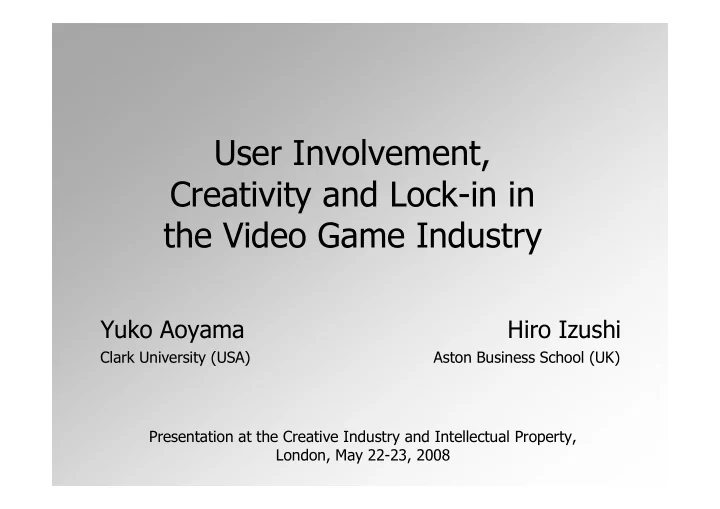

User Involvement, Creativity and Lock-in in the Video Game Industry Yuko Aoyama Hiro Izushi Clark University (USA) Aston Business School (UK) Presentation at the Creative Industry and Intellectual Property, London, May 22-23, 2008
The role of the user • An essential source of information in product development (Lundvall, 1988, 1992; von Hippel, 1976, 1977, 1989)
The role of the user (2) • “Customers are notoriously lacking in foresight” (Hamel and Prahalad, 1994, p.99).
The role of the consumer • Traditionally, largely “consultative” Early Adopters Laggards 13.5% 16% Innovators Early Late 2.5% Majority Majority 34% 34% x x 2 sd x � sd x + sd �
Open source development The culture of the Internet Peer-to-peer interactions • Possibilities for a new logic in the market system • Redefined boundaries and relationships between the producer and consumers
“Peer-to-peer” interactions Communal collaboration • Universally applicable to any industry? • Always beneficial to firms?
Sharing of innovations/knowledge Costs Benefits • Sharing of other resources • “Voice” • Reputation from peers
Peer-to-peer interactions in core gamer communities • GameSpy’s Fileplanet (www.fileplanet.com) • Planet Unreal (www.planetunreal.com) • “Cyberathletes”
Video Games Fans and hobbyist groups have always been the foundations
Origin: Pastime among engineers at the Tech Model Railroad Club, MIT Spacewar: The first video game 1962
Bedroom coders David Darling • Richard and David Darling, Codemasters • Philip and Andrew Oliver, Blitz Games/ Interactive Studio • Darren and Jason Falcus, Optimus Darren Falcus Software/ Atomic Planet Entertainment Andrew Oliver
Comic market ( comiké)
User-led innovation in the video game industry Depends upon the presence of fan communities • Existed from the beginning • New technology accelerates peer-to- peer interactions further
Rate of product Number of products innovation Number of firms in the industry Profit margins Rate of process innovation Fluid Transitional Mature Discontinuities A dominant design appears
7 US market in 2007 6 (million units) 5 4 3 2 1 0 Nintendo Wii Sony PS3 Microsoft Xbox 360 4 3 2 1 Japanese market in 2007 (million units) 0 Nintendo Wii Sony PS3 Microsoft Xbox 360
Dependant variable: “Do you prefer Wii to PS3 and Xbox 360?” (No: 0; Yes: 1) Coefficient Standard Wald chi- Sig. Odds estimate error square ratio Intercept 0.90 0.86 1.09 0.30 Gender (Male: 0; 2.12 0.63 11.36 0.00 8.36 Female: 1) Hours of play per -1.15 0.46 6.26 0.01 0.32 day Do you like -1.19 0.61 3.74 0.05 0.31 action/shooting games? (No: 0; Yes: 1)
Product development of Nintendo Wii • “[Wii] was unimaginable for hard-core gamers.” • Don’t listen to your customers
Don’t listen to the users • “Online gaming normally belongs to the most aggressive players, and they can be a very vocal group. For the casual player, this kind of interaction can be very intimidating. I believed if we catered to only this very vocal group of hard-core players, we could never truly expand the audience.” Satoru Iwata at Game Developers Conference’s keynote speech on 23 March 2006
Producer status quo • “Although our business is to provide our customers with surprises and fun that have not existed before, we are doing this less and less while not realizing it. We have come to compete on specifications – programming 50% more data than last year, setting more tracks, scenes and options, increasing the length of a game to complete, etc.” • Satoru Iwata in an interview with PC Watch, 2006 .
Status Quo Users • “The difficulty we were faced with at the development of the Wii’s interface was how to convince those users and game designers who were accustomed with traditional interfaces. This was a big hurdle. Teamed up with industrial designers, we felt as if we were challenging their conventional wisdom, if not we were waging a war against those users and game designers. Of course, we did not see them as our enemy. However, we had to challenge them as they were conservative, being used with the status quo in the industry.” Shigeru Miyamoto, Director of Information & Development (2007).
Hardcore Gamer’s Reaction to Wii • “Now we’re in the 21st century. … Sadly, some companies haven’t caught on... There’s Nintendo, for example. … Right now, it seems like they’re forgetting that …nothing will change them into a field of worthy competitors.” Hardcore Gamer Magazine , 20 November 2006
Conclusions • Risk of over-application • User motivation is a key: not applicable to every industry • User communities can lock firms in to an existing trajectory
Recommend
More recommend